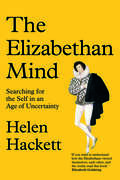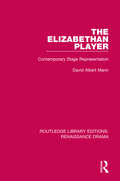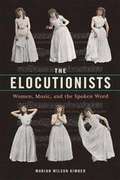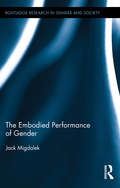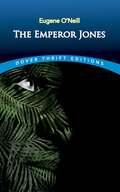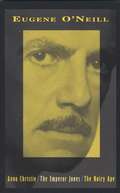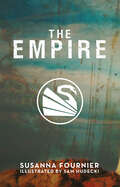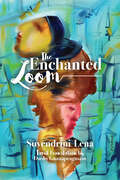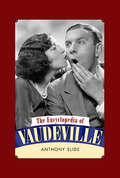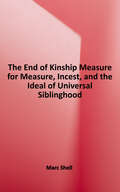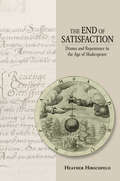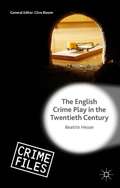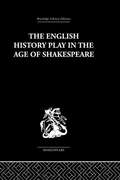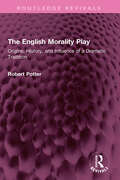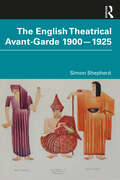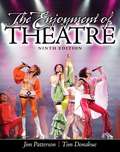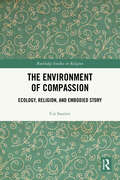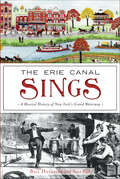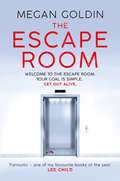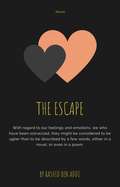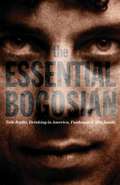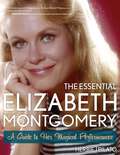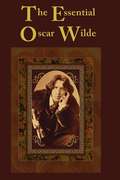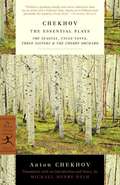- Table View
- List View
The Elizabethan Mind: Searching for the Self in an Age of Uncertainty
by Helen HackettThe first comprehensive guide to Elizabethan ideas about the mind What is the mind? How does it relate to the body and soul? These questions were as perplexing for the Elizabethans as they are for us today—although their answers were often startlingly different. Shakespeare and his contemporaries believed the mind was governed by the humours and passions, and was susceptible to the Devil&’s interference. In this insightful and wide-ranging account, Helen Hackett explores the intricacies of Elizabethan ideas about the mind. This was a period of turbulence and transition, as persistent medieval theories competed with revived classical ideas and emerging scientific developments. Drawing on a wealth of sources, Hackett sheds new light on works by Shakespeare, Marlowe, Sidney, and Spenser, demonstrating how ideas about the mind shaped new literary and theatrical forms. Looking at their conflicted attitudes to imagination, dreams, and melancholy, Hackett examines how Elizabethans perceived the mind, soul, and self, and how their ideas compare with our own.
The Elizabethan Player: Contemporary Stage Representation (Routledge Library Editions: Renaissance Drama)
by David Albert MannIn this book, first published in 1991, David Mann argues for more attention to the performer in the study of Elizabethan plays and less concern for their supposed meanings and morals. He concentrates on a collection of extracts from plays which show the Elizabethan actor as a character onstage. He draws from the texts a range of issues concerning performance practice: the nature of iterance; doubling and its implications for presentational acting; the importance of clowning and improvisation; and the effects of audience and venue on the dynamics of performance. The author suggests that the stage representation of players is in part a nostalgic farewell to the passing of an impure but perhaps more vital theatre, and in part an acknowledgement of the threat the adult theatre’s growing sophistication offered to its institutional and adolescent rivals. This title will be of interest to students of Drama and Performance.
The Elocutionists: Women, Music, and the Spoken Word
by Marian Wilson KimberEmerging in the 1850s, elocutionists recited poetry or drama with music to create a new type of performance. The genre--dominated by women--achieved remarkable popularity. Yet the elocutionists and their art fell into total obscurity during the twentieth century. Marian Wilson Kimber restores elocution with music to its rightful place in performance history. Gazing through the lenses of gender and genre, Wilson Kimber argues that these female artists transgressed the previous boundaries between private and public domains. Their performances advocated for female agency while also contributing to a new social construction of gender. Elocutionists, proud purveyors of wholesome entertainment, pointedly contrasted their "acceptable" feminine attributes against those of morally suspect actresses. As Wilson Kimber shows, their influence far outlived their heyday. Women, the primary composers of melodramatic compositions, did nothing less than create a tradition that helped shape the history of American music.
The Embodied Performance of Gender (Routledge Research in Gender and Society)
by Jack MigdalekNorms of embodied behaviour for males and females, as promoted in mainstream Western public arenas of popular culture and the everyday, continue to work, overtly and covertly, as definitive and restrictive barriers to the realm of possibilities of embodied gender expression and appreciation. They serve to disempower and marginalize those not inclined to embody according to such dichotomous models. This book explores the ramifications of the way our gendered, sexed and culturally constructed bodies are situated toward notions of difference and highlights the need to safeguard the social and emotional well-being of those who do not fit comfortably with dominant norms of masculine/feminine behaviour, as deemed appropriate to biological sex. The book interrogates gender inequitable machinations of education and performance arts disciplines by which educators and arts practitioners train, teach, choreograph, and direct those with whom they work, and theorizes ways of broadening personal and social notions of possible, aesthetic, and acceptable embodiment for all persons, regardless of biological sex or sexual orientation. The author’s own struggles as a performance artist, educator, and person in the everyday, as well as the findings of empirical fieldwork with educators, performance arts practitioners, and high school students, are employed to illustrate and advocate the need for self reflexive scrutiny of existing and hidden inequities regarding the embodiment of gender within one’s own habitual perspectives, taste, and practices.
The Emperor Jones (Dover Thrift Editions Ser.)
by Eugene O'NeillBrutus Jones, a former Pullman car porter wanted in the United States on two murder charges, has established himself as the self-proclaimed ruler of a West Indian island. Warned that his subjects are about to rebel, he flees to the jungle -- sick with fright -- where he is plagued by ghosts of the men he has murdered and haunted by visions of injustices done to his race. Powerful scenes, punctuated by beating tom-toms, suggest Jones's panic as he flees his angry countrymen and his own personal demons.First produced in 1920, The Emperor Jones helped establish O'Neill's reputation as one of America's most important dramatists. Bold and expressionistic, the play was an instant success on the stage and has remained one of the staples of the dramatic repertoire. It is now available to a wide audience in this attractive, inexpensive Dover Thrift Edition.
The Emperor Jones, Anna Christie, The Hairy Ape
by Eugene O'NeillThree plays by the Nobel Prize winner about people at the base of the social ladder suffering from grief and guilt, as all people can identify with their trials and judgment.
The Emperor's New Clothes: A Comedy For All Ages (Into Reading, Level K #88)
by Doug Roy Hans AndersonNIMAC-sourced textbook
The Empire: A Trilogy of Modern Epics
by Susanna FournierExplore a world on the edge of change through three epic stories spanning five hundred years of imagined history, unpacking systems of power and what we are capable of in the pursuit of freedom. The story starts in The Philosopher’s Wife. Deep in the North, a philosopher exiled for promoting his atheist work amidst a bloody religious war yearns to ignite a revolution, but his personal life has collapsed into chaos. What begins as a desperate attempt to cure his wife’s animalistic behaviour erupts into a power struggle between the sexes, unleashing violent reckonings while the world outside hurtles towards an epoch-changing revolution. Over twenty years later, The Scavenger’s Daughter examines the true face of empire as Northern forces continue to march against the South, “liberating” all who stand in their way. In a landscape blown apart by war, we follow Jack and Ash, orphan soldiers belonging to the Black Swan army, trying to survive the camp, toxic masculinity, and each other until they can be free. When Jack returns to camp, his freedom having been bought for him by a mysterious philosopher, he believes his new life is just around the corner. But as rations wear thin and the king seizes the opium trails, the camp is thrown into chaos, putting everything Jack and Ash have known—including Jack’s first love, Sarah—at risk. Centuries later, in Four Sisters, we meet Sarah again as a woman and former Madam who has survived death, the toppling of regimes, and centuries of war. When a mysterious plague breaks out, she is forced to relocate to a quarantined zone called “The Skirts” with four young girls who were orphaned by the women she once employed. But when a strange doctor arrives and discovers the girls are plague-positive, Sarah must decide whether to go ahead with an experimental treatment or none at all. As time itself begins to erode, this found family of women must face loss, love, and their individual struggles for power in a violent world. For fans of Game of Thrones, The Handmaid’s Tale, and The Mists of Avalon, The Empire is both foreign and shockingly familiar, leaving you asking, how did we get here, and where are we going?
The Enchanted Loom
by Suvendrini LenaThe Sri Lankan civil war has left many scars on Thangan and his family, most noticeably the loss of his eldest son and the crippling epileptic seizures brought on by his torture. As the final days of the war play out, the family bears witness from their new home of Toronto. Thangan’s other son Kanan comes home from a protest, shaken that someone referred to him by his brother’s name. His young daughter Kavitha innocently dances around with a mysterious pair of anklets that she found. And Thangan’s wife Sevi is consumed with feeling responsible for her broken family. Amidst the ongoing trauma, the family is faced with the possibility of Thangan undergoing neurological surgery. Will the surgery give them a chance to heal, or will it cause even more pain?Presented in both English and Tamil, this poetic play is both medical and mystical, drawing a connection between trauma and memory that creates a stark reminder of loss, hope, family, and freedom.
The Encyclopedia of Vaudeville
by Anthony SlideThe Encyclopedia of Vaudeville provides a unique record of what was once America's preeminent form of popular entertainment from the late 1800s through the early 1930s. It includes entries not only on the entertainers themselves, but also on those who worked behind the scenes, the theatres, genres, and historical terms. Entries on individual vaudevillians include biographical information, samplings of routines and, often, commentary by the performers. Many former vaudevillians were interviewed for the book, including Milton Berle, Block and Sully, Kitty Doner, Fifi D'Orsay, Nick Lucas, Ken Murray, Fayard Nicholas, Olga Petrova, Rose Marie, Arthur Tracy, and Rudy Vallee. Where appropriate, entries also include bibliographies. The volume concludes with a guide to vaudeville resources and a general bibliography. Aside from its reference value, with its more than five hundred entries, The Encyclopedia of Vaudeville discusses the careers of the famous and the forgotten. Many of the vaudevillians here, including Jack Benny, George Burns and Gracie Allen, Jimmy Durante, W. C. Fields, Bert Lahr, and Mae West, are familiar names today, thanks to their continuing careers on screen. At the same time, and given equal coverage, are forgotten acts: legendary female impersonators Bert Savoy and Jay Brennan, the vulgar Eva Tanguay with her billing as “The I Don't Care Girl,” male impersonator Kitty Doner, and a host of “freak” acts.
The End of Kinship: "Measure for Measure", Incest, and the Ideal of Universal Siblinghood
by Marc ShellIn this provocative commentary on Shakespeare's Measure for Measure, Marc Shell focuses on the play's basic themes of sexual extremism, exchange, and political order. At the crux of the play, he notes, the novice nun Isabella accuses her brother Claudio: "Is't not a kind of incest, to take life/From thine own sister's shame?" Shell's analysis shows exactly how Claudio's request is a kind of incest in a virtuoso analysis that extends his earlier work on philosophical and literary economies. In the first work to develop fully the thematic role of the monastic orders in Shakespeare's drama, Shell demonstrates that the play lays bare some of Western culture's most fundamental tensions -- between natural and political teleologies, between Christian and political ideals of brotherhood and the incest taboo, and between the pragmatic imperative to classify people and the moral imperative to treat them all alike. Drawing upon an astonishing range of literary material, Shell's discussion goes far beyond mere commentary -- offering, for example, brilliant readings of other Shakespearean plays. Praise for Marc Shell's The Economy of Literature and Money, Language, and Thought, also published by Johns Hopkins: "Shell offers admirably close readings [which are] often brilliant." -- The Eighteenth Century "A remarkable piece of work. Valuable for a wide range of readers from the expert to the inquiring generalist." -- Religious Studies Review "Stimulating and valuable." -- Comparative Literature
The End of Satisfaction: Drama and Repentance in the Age of Shakespeare
by Heather HirschfeldIn The End of Satisfaction, Heather Hirschfeld recovers the historical specificity and the conceptual vigor of the term “satisfaction” during the sixteenth and early seventeenth centuries. Focusing on the term’s significance as an organizing principle of Christian repentance, she examines the ways in which Shakespeare and his contemporaries dramatized the consequences of its re- or de-valuation in the process of Reformation doctrinal change. The Protestant theology of repentance, Hirschfeld suggests, underwrote a variety of theatrical plots “to set things right” in a world shorn of the prospect of “making enough” (satisfacere).Hirschfeld’s semantic history traces today’s use of “satisfaction”—as an unexamined measure of inward gratification rather than a finely nuanced standard of relational exchange—to the pressures on legal, economic, and marital discourses wrought by the Protestant rejection of the Catholic sacrament of penance (contrition, confession, satisfaction) and represented imaginatively on the stage. In so doing, it offers fresh readings of the penitential economies of canonical plays including Dr. Faustus, The Revenger’s Tragedy, The Merchant of Venice, and Othello; considers the doctrinal and generic importance of lesser-known plays including Enough Is as Good as a Feast and Love’s Pilgrimage; and opens new avenues into the study of literature and repentance in early modern England.
The English Crime Play in the Twentieth Century (Crime Files)
by Beatrix HesseThis is the first comprehensive study of the English crime play, presenting a survey of 250 plays performed in the London West End between 1900 and 2000. The first part is historically orientated while the second one establishes a tentative poetics of the genre. The third part presents an analysis of some 20 plays adapted from detective fiction.
The English History Play in the age of Shakespeare
by Irving Ribner.First published in 1957. This edition re-issues the second edition of 1965. Recognized as one of the leading books in its field, The English History Play in the Age of Shakespeare presents the most comprehensive account available of the English historical drama from its beginning to the closing of the theatres in 1642 and relates this development to Renaissance historiography and Elizabethan political theory.
The English Morality Play: Origins, HIstory, and Influence of a Dramatic Tradition (Routledge Revivals)
by Robert A PotterFirst published in 1975, The English Morality Play is the extended history of the English morality play, its persistence and flourishing as a dramatic tradition. The book sheds light on the intellectual and social origins of the morality play, its relationship to the medieval Corpus Christi cycle plays, its subject, purpose, conditions of original staging, and the abstract characters of its dramatis personae. The changing tradition is revealed within Renaissance drama, in the works of Skelton and Medwall, and the Reformation plays of Lindsay, Bale and Udall, as the morality play altered under the pressure of political events, escaped from the general suppression of religious drama, and in complex ways came to influence the dramatic conceptions of Marlowe, Shakespeare and Ben Jonson. Contemporary parallels to the English morality tradition in European drama are investigated, as is the rediscovery of the texts of the plays by eighteenth- and nineteenth-century critics. In the final chapter, Dr. Potter examines the revival of the morality tradition on the twentieth-century stage and its influence on such dramatists as Bernard Shaw, T. S. Eliot, W. B. Yeats and Bertolt Brecht. This book will be of interest to students of literature and drama.
The English Theatrical Avant-Garde 1900-1925
by Simon ShepherdThe English Theatrical Avant-Garde, 1900–1925 unearths an extensive range of hitherto forgotten or ignored theatre practices. In doing so it reveals some of the well-known figures of the early twentieth-century English theatre in a strikingly new light. It fluently describes an intensity of innovation and experiment that together made the Edwardian theatre rather more radical, and rather more queer, than we’ve ever thought. Where the majority of writing on the early twentieth-century theatrical avant-garde is concerned with European movements and experiments, English activity of the period is often seen as parochial and conservative – mainly realism and issues-based drama. This book presents a new model of how avant-gardes might work; a model based not on masculine individualism but on communal inclusion. In describing this fascinating material, the author introduces us to many new figures and shows familiar ones in different ways: there’s Florence Farr, independent woman; Bob Trevelyan, radical pacifist and music drama pioneer; Granville Barker doing fairy plays while de-dramatising drama; Laurence Housman, socialist, homosexual, scripting St Francis; and the oddly modern J.M. Barrie. Together they made theatre practices rich in their diversity but consistent in their attempt to be new, producing a theatrical avant-garde unlike any other. This is a vital and indispensable new study for scholars and students of early twentieth-century theatre in England and beyond.
The Enjoyment of Theatre (Ninth Edition)
by Jim A. Patterson Tim DonohueBrings theatre to life for students by showing the relationship and relevance of the performing arts to their everyday lives The Enjoyment of Theatre's balanced coverage of performance and history provides a comprehensive and accessible introduction to theatre for both majors and nonmajors. This text establishes the aesthetic underpinnings of theatre art and then explores performance and production topics such as playwriting, acting, directing, design, and the theatre industry. The Enjoyment of Theatre also covers the full span of theatre's 2,500-year history. The authors make theatre come alive for students by showing them how theatre is relevant to their everyday lives. Learning Goals: Upon completing this book, readers will be able to: Understand today's theatre and the social impact of the theatre since its inception Explore theatre's cultural and economic context
The Environment of Compassion: Ecology, Religion, and Embodied Story (Routledge Studies in Religion)
by Cia SautterThe Environment of Compassion explores questions of what it means to be in relationship to nature, if and how it is a religious experience, and how understanding humans as part of nature alters theology. The book offers a performance perspective that looks at ritual, dance, and theatre as a means of presenting discussion of sacred values in the public realm. The premise is that performance may serve as an effective means for developing human sacred values that recognize the more-than-human world, as it increases intersubjective awareness to address issues of social and environmental justice. The author investigates religion and theatre as a means of better understanding how eco-consciousness requires an aesthetic of the sacred. Rather than separate religion, culture, and nature, the book presents an aesthetic looking at the relationship between them. It considers how an embodied theatrical story might develop an inclusive community of compassion. Weaving the chapters together is an account of The Garden: A Refuge, an eco-centered play based on the biblical book of Job. Ecotheology, aesthetics, and embodiment theories are examined throughout, with scholarship and examples drawn largely from the Jewish tradition. The book is relevant to scholars of religion and theology, particularly those with an interest in the environment, as well as theatre, dance, and performance studies.
The Erie Canal Sings: A Musical History of New York's Grand Waterway
by Bill Hullfish Dave RuchLife working along the banks of the Erie Canal is preserved in the songs of America's rich musical history. Thomas Allen's "Low Bridge, Everybody Down" has achieved iconic status in the American songbook, but its true story has never been told until now. Erie songs such as "The E-ri-e Is a-Risin'" would transform into "The C&O Is a-Risin'" as the song culture spread among a network of other canals, including the Chesapeake and Ohio and the Pennsylvania Main Line. As motors replaced mules and railroads emerged, the canal song tradition continued on Broadway stages and in folk music recordings. Author Bill Hullfish takes readers on a musical journey along New York's historic Erie Canal.
The Escape Room: 'One of my favourite books of the year' LEE CHILD
by Megan GoldinWelcome to the escape room. Your goal is simple. Get out alive.In the lucrative world of Wall Street finance, Vincent, Jules, Sylvie and Sam are the ultimate high-flyers. Ruthlessly ambitious, they make billion-dollar deals and live lives of outrageous luxury. Getting rich is all that matters, and they'll do anything to get ahead.When the four of them become trapped in an elevator escape room, things start to go horribly wrong. They have to put aside their fierce office rivalries and work together to solve the clues that will release them. But in the confines of the elevator the dark secrets of their team are laid bare. They are made to answer for profiting from a workplace where deception, intimidation and sexual harassment thrive.Tempers fray and the escape room's clues turn more and more ominous, leaving the four of them dangling on the precipice of disaster. If they want to survive, they'll have to solve one more final puzzle: which one of them is a killer?Praise for The Escape Room:"High wire tension from the first moment to the last. Four ruthless people locked in a deadly game where victory means survival. Gripping and unforgettable!" Harlan Coben"Fantastic. One of my favourite books of the year." Lee Child"Amazing...a thriller set in an elevator [that explores] the vast territory of people's worst natures. A nightmarish look inside ourselves. Simply riveting." Louise Penny"A sharp, slick, utterly engrossing thriller. This knockout debut hooked me from the first page and didn't let go." Cristina Alger, USA Today bestselling author of The Banker's Wife
The Escape: The Escape
by Rashid Ben AddiIt is the cry of a whole generation, unable to get out of the cycle of inertia, and still sees the ray of hope coming from behind the border When we are assured of the low level of images that were exposing the boats of death that lead the young to die, just as butterflies go to the Holocaust and follow the beam of light, shaking the narrator reassured, and tells us that death boats are still fine It is only the destination of the butterflies that have differed, but their burning is still going on in front of the sight of a homeland that is in dire need of its wings and its lava, which withers without price. Young people flee to bars and endless hell, or sink into the belly of the Ghoul, to become a hand to strike terrorism, or leave to Turkey, and cut all ties to the homeland .. <P><P>Or live endless dreams of escape may be in the coffin, may be a reminder to America For eternal migration And if all these manifestations of escape, lived by one hero, is "Yazid" hero of the novel, but in fact pictures of a whole generation, feels that he is outcast, and does not trust much that anyone will reach the truth of his feelings, so the young writer from the beginning anger In Manfesto opens his novel and says: Our feelings and feelings we are outcasts, uglier than words described in a novel or even in a poem Let the novel begin with infinite circles from Taha, Rabat, that harsh city. <P><P>The bus is scattered between the bus (life), the cafe, and the sea The dream of a revolution comes fleeting, not for a better tomorrow, but for equal losses, or to lose the winners in this grim reality At the peak of despair lies the false hope more than once, on the establishment of a dream, or promise a way worse than the current way. Hope may appear in the spectrum of a woman appearing and disappearing, or in the pregnancy of a child aborting harshly, and remains just a painful memory, or loss added to the rest of the losses Even after escaping to Turkey, fate continues to play with a desperate yo
The Essential Bogosian
by Eric Bogosian"What Lenny Bruce was to the 1950s, Bob Dylan to the 1960s, Woody Allen to the 1970s--that's what Eric Bogosian is to this frightening moment of drift in our history."--Frank Rich, The New York Times
The Essential Elizabeth Montgomery: A Guide to Her Magical Performances
by Herbie J PilatoBewitched star Elizabeth Montgomery was one of the most prolific and popular actresses of the twentieth century. In her more than five hundred appearances on television, film and the stage, Elizabeth Montgomery&’s talent, charisma, and personalityhave charmed millions for decades. This delightful new book delineates, dissects, and celebrates the diversity and minutia of Montgomery&’s remarkable career, while chronicling just how much her real life spilled into her historic roles on stage and screen. The book is based on Pilato&’s exclusive interviews with the actress and supplemented withcommentary provided by myriad entertainment professionals, journalists, and media and classic TV historians, including the Oscar-nominated actress Juanita Moore (Montgomery&’s co-star from the historic &“White Lie&” episode of TV&’s 77 Sunset Strip), and producer/writer/actor Jimmy Lydon (Elizabeth&’s co-star from the Wagon Train episode &“The Victorio Bottecelli Story.&”)Including plot summaries, airdates, release dates, and behind-the-scenes notes and anecdotes of select performances, The Essential Elizabeth Montgomery is the ultimate handy, entertaining, and informative reference to the on- and off-screen adventures of one of the world&’s most beloved stars.
The Essential Oscar Wilde
by Oscar WildeCollected her in one omnibus edition are Oscar Wilde's most important works including The Importance of Being Earnest, The Picture of Dorian Gray, Salome, Selected Poems of Oscar Wilde, The Soul of Man Under Socialism, The Happy Prince and Other Tales, and The Canterville Ghost. These works of poetry, fiction, drama, and prose encompass Wilde's entire career and they display his range of style and wit. Wilde is one of the most important writers in the history of the English language. Wilder Publications is a green publisher. All of our books are printed to order. This reduces waste and helps us keep prices low while greatly reducing our impact on the environment.
The Essential Plays
by Anton ChekhovChekhov's four essential masterpieces for the theater: The Seagull, Uncle Vanya, Three Sisters, and The Cherry Orchard have been staged throughout the United States, Canada, and Great Britain.
